Prust Surname Ancestry ResultsOur indexes 1000-1999 include entries for the spelling 'prust'. In the period you have requested, we have the following 84 records (displaying 1 to 10): Single Surname Subscription | | | Buying all 84 results of this search individually would cost £478.00. But you can have free access to all 84 records for a year, to view, to save and print, for £100. Save £378.00. More... |
These sample scans are from the original record. You will get scans of the full pages or articles where the surname you searched for has been found. Your web browser may prevent the sample windows from opening; in this case please change your browser settings to allow pop-up windows from this site. Patent Rolls: entries for Buckinghamshire
(1279-1280)
Calendars of the patent rolls of the reign of king Edward I are printed in the Calendars of State Papers: but these cover only a fraction of the material on the rolls. From 1881 to 1889 the reports of the Deputy Keeper of the Public Record Office also include calendars of other material from the rolls - about five times as many entries as in the State Papers - predominantly mandates to the royal justices to hold sessions of oyer and terminer to resolve cases arising locally; but also other general business. The calendar for the 8th year of king Edward I [20 November 1279 to 19 November 1280], hitherto unindexed, is covered here.PRUST. Cost: £6.00.  | Sample scan, click to enlarge

| Courtroll of Ruislip, Middlesex
(1296)
King's College, Cambridge, has a series of courtrolls relating to the English possessions of the Norman abbey of Bec. C 11, a single membrane, contains the records of manorial courts from June to July 1296. F. W. Maitland selected pleas from this roll, transcribed them into extended Latin, with an English translation facing, and they were published in 1889 by the Selden Society. Maitland's translation anglicizes or modernizes the surnames, so we have confined our index to the Latin; but that is not without its difficulties, because the 13th-century clerk often latinizes what would have been indigenous English surnames. The courtrolls represented are those of Ogbourne (Wiltshire) 28 July 1296; Weedon Beck (Northamptonshire) 21 July 1296; and Ruislip (Middlesex) 15 June 1296.
PRUST. Cost: £4.00.  | Sample scan, click to enlarge
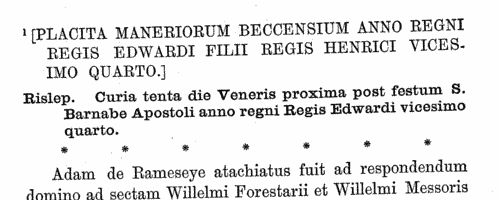
| Clerks and Clergy in Cornwall and Devon
(1307-1326)
The register of bishop Walter de Stapeldon of Exeter, containing general diocesan business, but in particular including ordination lists for monks and clergy. Only a small proportion of the clerks went on to acquire benefices and remained celibate. LatinPRUST. Cost: £6.00.  | Sample scan, click to enlarge

| Inhabitants of the city of Oxford
(1380)
The poll tax granted in 1379 was assessed and raised in the following two years. Every lay person, man or woman, aged over 15 was to be taxed. The returns for the city of Oxford, edited by J. E. Thorold Rogers, were printed for the Oxford Historical Society in 1891.PRUST. Cost: £4.00.  | Sample scan, click to enlarge
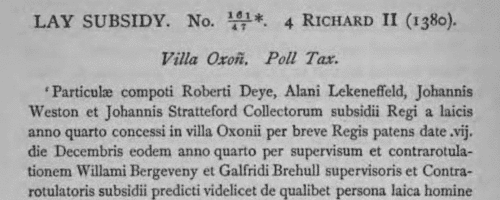
| Stanley Lay Subsidy: Final Return
(1545)
The lay subsidy of Agbrigg wapentake in the West Riding of Yorkshire (207/186) is in two parts: the anticipation and the final return. The subsidy, assessed at 1d in the pound on goods up to £5, 2d in the pound on goods worth £5 and above, and 2d in the pound on land, had been granted by parliament to king Henry VIII for three years. The anticipation, certified by the commissioners 30 April 1545, listed by township the holders of £6 or more in land or £10 or more in goods 'which said persons by virtue of our souerayng lords most jentill request and lovyng desire ar content frankly, quietly and indeladby to pay ther last payment' in advance, by way of anticipation of the third year's payment. The final return, certified 26 October 1545, lists the less wealthy part of the population, again by township, with their full names, assessment of their property, and (right-hand column) the amount due to be collected from them.PRUST. Cost: £4.00.  | Sample scan, click to enlarge
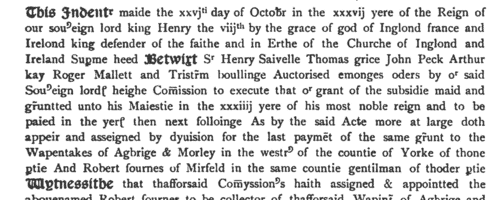
| Jurymen in the North Riding of Yorkshire
(1605-1612)
The Quarter Sessions minute books for the North Riding from April 1605 to July 1612 were edited by the Rev. J. C. Atkinson for the North Riding Record Society and published in 1884. This is a calendar of sessional orders, minutes of criminal cases, memoranda and other entries of record concerning the administration of the riding, for the quarter sessions and special sessions held at Thirsk, Stokesley, Richmond, Malton, Helmsley, Northallerton and Topcliffe. This is the index to the jurors.PRUST. Cost: £4.00.  | Sample scan, click to enlarge
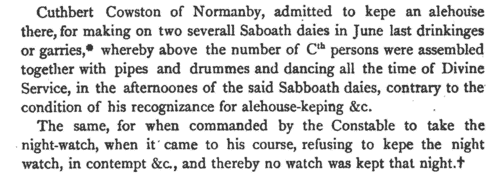
| Liegemen and Traitors, Pirates and Spies
(1625-1626)
The Privy Council of Charles I was responsible for internal security in England and Wales, and dealt with all manner of special and urgent matters
PRUST. Cost: £4.00.  | Sample scan, click to enlarge

| Official Papers
(1639)
The State Papers Domestic cover all manner of business relating to Britain, Ireland and the colonies, conducted in the office of the Secretary of State as well as other miscellaneous records.
PRUST. Cost: £4.00.  | Sample scan, click to enlarge
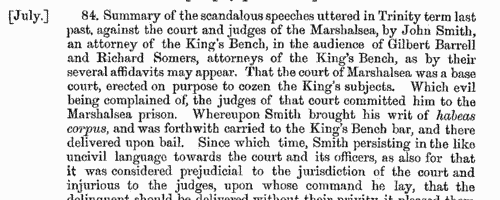
| PCC Probate Abstracts
(1652-1653)
The Prerogative Court of Canterbury's main jurisdiction was central and southern England and Wales, as well as over sailors &c dying abroad: these brief abstracts usually give address, date of probate and name of executor or administrator
PRUST. Cost: £2.00.  | Sample scan, click to enlarge

| Allegations for marriages in southern England
(1687-1694)
The province or archbishopric of Canterbury covered all England and Wales except for the northern counties in the four dioceses of the archbishopric of York (York, Durham, Chester and Carlisle). Marriage licences were generally issued by the local dioceses, but above them was the jurisdiction of the archbishop, exercised through his vicar-general. Where the prospective bride and groom were from different dioceses it would be expected that they obtain a licence from the archbishop; in practice, the archbishop residing at Lambeth, and the actual offices of the province being in London, which was itself split into myriad ecclesiastical jurisdictions, and spilled into adjoining dioceses, this facility was particularly resorted to by couples from London and the home counties, although there are quite a few entries referring to parties from further afield. The abstracts of the allegations given here usually state name, address (street in London, or parish), age, and condition of bride and groom; and sometimes the name, address and occupation of the friend or relative filing the allegation. Where parental consent was necessary, a mother's or father's name may be given. The ages shown should be treated with caution; ages above 21 tended to be reduced, doubtless for cosmetic reasons; ages under 21 tended to be increased, particularly to avoid requiring parental consent; a simple statement 'aged 21' may merely mean 'of full age' and indicate any age from 21 upwards. These are merely allegations to obtain licences; although nearly all will have resulted in the issuing of the licence, many licences did not then result in marriage. PRUST. Cost: £4.00.  | Sample scan, click to enlarge

|
Research your ancestry, family history, genealogy and one-name study by direct access to original records and archives indexed by surname.
|












